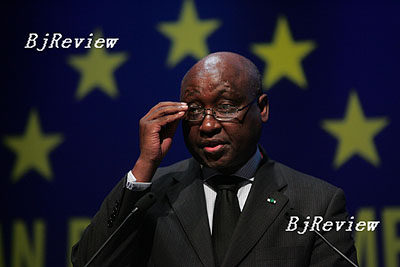
Half a year ago, Chinese and African leaders gathered in Beijing for the Beijing Summit of the Forum on China-Africa Cooperation (FOCAC) to orientate the future development of Sino-African relations. Now, in May, African countries will send their representatives to Shanghai, this time, for a financial event.
On May 16-17, the 42nd Annual Meeting of the Board of Governors of the African Development Bank (AfDB) will be held in Shanghai in east China, making China the second country to hold the annual meeting of the AfDB, following Spain in 2001.
Unlike other regional development banks, the AfDB, the most important inter-governmental financial organization in Africa with 77 members, including all the 53 African countries and 24 non-African countries, does not focus on supplying loans and donations only for its African members. It actively participates in global capital markets with a sound credit rating. The bank invests and finances globally through issuing bonds and stock deals in the world’s important financial centers, including Tokyo and New York, and with the capital, it grants low-interest and interest-free loans to underdeveloped countries in Africa.
“The AfDB plays an important role in rejuvenating the African economy and I am confident in its future development,” said Eric Chinje, a spokesman of the AfDB who visited China earlier this year.
According to Chinje, of the 53 African countries, many have a population smaller than Beijing’s, and 22 have a population of less than five million. “It is impossible for them to equally compete with the world powers,” he stressed. He added that the AfDB’s role is to pool the strength of all these countries to form one large economic group so as to equally participate in global economic development. Thus, the AfDB is focusing on promoting basic infrastructure construction such as roads, telecommunications, energy and water irrigation construction, through which to connect all African countries. Meanwhile, education, health and social services are also important parts of its work.
However, for historic reasons, it is impossible for the AfDB to change the situation in Africa by itself. Against that backdrop, the warming of Sino-African cooperation brings new hopes to African countries.
In Chinje’s view, the most important aspect of Sino-African cooperation is not financial aid or bilateral trade, but the fact that it is based on a win-win philosophy initiated by China’s leadership, which is showing the world a new kind of international relationship.
According to him, Africa treasures the attitude of “not only asking for but also giving out,” and, because of China’s important position on the global stage, this attitude is attracting the world’s attention.
“It is very important for the AfDB, at this crucial time, to choose China’s Shanghai to hold the annual meeting. This will supply an opportunity for African countries to learn from China’s development experiences,” said Donald Kaberuka, President of the African Development Bank Group, adding that China’s participation in Africa’s building can benefit both sides.
China became a member of the AfDB in 1985. By the end of 2006, China held 24,230 shares in the bank, accounting for 1.117 percent of the total shares, and had committed itself to donate $347 million to the African Development Fund, the soft loan arm of the group, to support basic infrastructure construction, fight poverty and promote education in Africa.
“It is of great significance for China to host the annual meeting of the AfDB since China can take this opportunity to illustrate its achievements and experiences of reform and its opening-up policy. Meanwhile, before the inauguration of the annual meeting, the AfDB authority will hold a series of symposiums, which will gather together business people and entrepreneurs. This may help increase the mutual understanding of people from business and enterprise circles in China and African countries and promote Sino-African economic and trade exchanges and cooperation,” said Cheng Xiaoyang, Director of the Information Office of the People’s Bank of China (PBOC), China’s central bank.
In February 2005, PBOC Governor Zhou Xiaochuan wrote to the then AfDB President Omar Kabbaj, noting that China would like to host the AfDB annual meeting, and the suggestion was approved one year later. According to common practice, Zhou became the president of the board of governors of the AfDB and visited the bank’s temporary headquarters in Tunis this January.
China has close connections with the AfDB. In October 2003, China and the AfDB jointly held a high-level symposium on China-Africa economic reform and development strategy in Beijing, with participants including Kabbaj and ministers from 20 African countries. The year 2005 marked the 20th anniversary of China’s cooperation with the AfDB, and in that year, China, in partnership with the AfDB, the Central Bank of West African States and the Eastern and Southern African Trade and Development Bank, held a symposium of AfDB business opportunities to promote mutual understandings between China and Africa.
“This annual meeting falls in an important development period when African and Chinese leaders are reiterating their determination to strengthen bilateral relations. As an important follow-up activity to the Beijing Summit of the FOCAC, the annual meeting has special significance,” said Chinje. |
